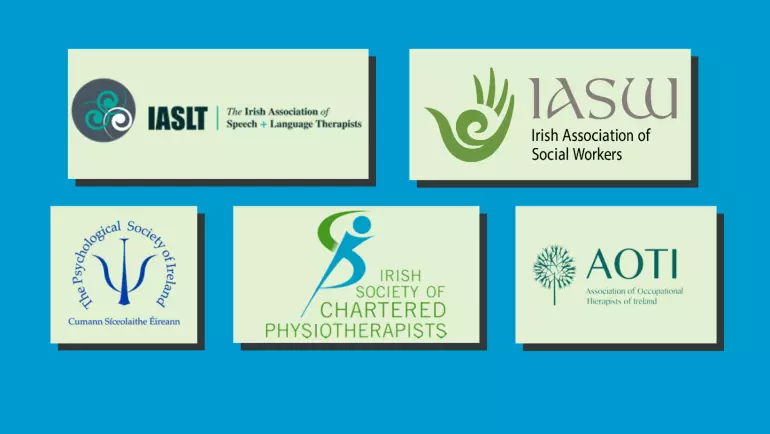
As the representative organisations of Health and Social Care Professions (HSCPs), we have significant concerns in relation to clinical governance, risk management, the erosion of professional autonomy and HSCP career structures within Children's Disability Services. We have previously highlighted concerns and yet continue to see risks and failures throughout Children’s Disability Services. There is a lack of a clear plan for ongoing evolution of services to children under Progressing Disability Services (PDS) and for how disability services will be delivered over the next 5 to 10 years. We understand that the HSE is drafting a plan, which we welcome. It is vital that this takes cognisance of projected growth in demand for disability services, career structure within PDS, staff training and continuing professional development (CPD) supports. Appropriate consultation and meaningful engagement with services, clinicians and professional representation is required to ensure that this plan addresses concerns raised and has appropriate implementation.
Importance of Discipline Manager Role.
The role of Children’s Disability Network Manager (CDNM) does not provide sufficient discipline-specific clinical governance in Children’s Disability Network Teams (CDNTs) and there continues to be a need for Discipline Managers to provide this clinical governance and service development in children’s disability services, as is the case in all other HSE services. This gap in governance structure and discrepancy across teams is resulting in significant clinical concerns, risks and distress to practising clinicians. It is also impacting on the recruitment and retention of HSCPs.
The role of Discipline Manager is vital to provide oversight with regard to skill development and professional development needs of clinicians, as well as allocating appropriate supervision and monitoring gaps in competency to ensure safe clinical practice. Discipline Managers also provide clinical governance for discipline specific interventions. For teams who have retained Discipline Managers, roles and responsibilities between Discipline Managers and CDNT Managers are yet to be clearly defined. This is leading to inequity with clinical support, development structures and uncertainty for staff at all levels across teams. We call on the HSE to engage with our professional bodies to discuss and address these concerns.
Clinical Specialists Are Not Discipline Managers.
Recently, generic clinical specialist posts have been advertised. There are agreed HSE job descriptions and competencies for clinical specialist roles which these generic roles deviate from. It appears that the HSE is tailoring these roles, further eroding the Discipline Manager's responsibilities and transferring those to clinical specialist roles. A Discipline Manager has the authority/expertise in how to quality assure the whole career from an employment, safety assurance, service quality, recruitment and retention perspective, whereas a clinical specialist has extended skills in the clinical research and development sub-domains. Decision making around professional practice, governance and oversight rests with a Discipline Manager. Decision making around clinical service design, provision, and education is more the domain of the clinical specialist. Some clinical specialists progress to become service managers, others do not wish to be profession line managers and instead wish to remain in their role of maximising the potential of children through their clinical excellence and ability to educate re service provision. In order to progress the power and impact of PDS, both roles are needed in appropriate measure.
We support the development of appropriate discipline specific clinical specialist roles which will enable clinical specialists within each discipline to lead research within teams and ensure a commitment to evidence-based practice is maintained and promoted. The lack of consistent discipline specific support pathways and clinical specialist roles impacts on the delivery of care, resulting in a lack of development opportunities for clinicians and ultimately leads to risk to children’s care. We strongly advocate for appropriate clinical specialist posts in line with agreed job descriptions. We also advocate for a sufficient number of senior grades HSCP posts across CDNTs.
Scope of Practice.
We are particularly concerned that the development and reconfiguration of disability services may lead to HSCPs being asked to develop services, or work without the appropriate discipline-specific experience or supervision. As many of us are CORU registered professionals, we must adhere to CORU’s Code of Professional Conduct and Ethics including scope of practice obligations. We are bound to act and practice within the limits of registered professionals’ knowledge, skills, competence and experience and practise only in areas in which we are appropriately supervised.
Comprehensive Workforce Planning Strategy.
The Health Sector turnover document (2020) shows that the rate for Health & Social Care Professionals was 7.4% with higher rates amongst therapy professions and psychologists. The issues highlighted here have a direct impact on staff retention and recruitment in disability services. We continue to call for a comprehensive workplace planning strategy that addresses the clear recruitment and retention issues. Many of those delivering and accessing agree that Children’s Disability Services are in crisis.
Consultation with Professional Bodies
Meaningful and timely consultation with our organisations is required regarding current and future delivery of Children’s Disability Services. As professional organisations, we have previously highlighted these issues to the Oireachtas, Chief Clinical Officer and HSE. Appropriate and urgent action is required with which we are willing and waiting to help.
ENDS.